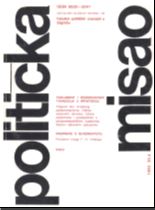Postmodernističke vrijednosne orijentacije (tendencije izbora 1992)
Post–Modern Value Orientations (Election trends in 1992)
Author(s): Inge Perko-ŠeparovićSubject(s): Political history, Government/Political systems, Electoral systems, Transformation Period (1990 - 2010)
Published by: Fakultet političkih znanosti u Zagrebu
Keywords: postmodern; values; elections; 1992; Croatia;
Summary/Abstract: Research on the post-modern orientations of voters in Croatia started in the 1990 elections, and was continued in the 1992 elections. The indicators of post-modern value orientations had to be changed. War had distanced the Croatian electorate considerably from desired rational orientation - within which modem and post-modem differ. Post-modem had a small erosion, from 4 to 3.2%, while desired rational orientation fell from 60% to only 6.8%. Post-modem oriented voters were most evident in the youngest age group, those studying, and professionals. Changes were noted in the agricultural group, who climbed from last place to third. The results of the research follow post-modem orientations towards the concepts of sustainable development and sustainable energy policies. They indicate a significantly better situation when the subject is the presence of post-modem value orientations in the electorate of Croatia. It appears to be divided almost equally; 50% support the classic concept of development, while 50% support sustainable development. This could cause political polarization of the voting body when reconstruction and development are on the agenda. With respect to the energy policy as one of the most important components of development policy, the results of the research indicate that almost the entire voting body (97%) would support only a sustainable energy policy.
Journal: Politička Misao
- Issue Year: XXX/1993
- Issue No: 04
- Page Range: 118-129
- Page Count: 12
- Language: Croatian

